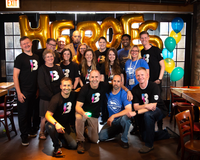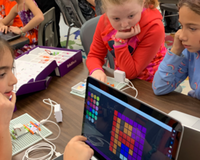Can coding benefit autism? If the increased focus on computer science and coding skills in schools gives any sign, it’s good for kids in general. But there’s something extra that makes learning to code for children with autism even more worthwhile. While there’s historically been talk of how technology has wormed its way into every corner of our lives, technology has value when used properly, and it always will.
Why is Coding Good for Autism?
Coding uses sets of tasks and instructions to make computers do their job. All those apps, cool robots, websites and technology we take for granted every day have code behind them. Surprisingly, coding remains a good fit for children with autism because they possess the exact qualities needed to master coding. By allowing them to use the skills they already have, you'll be setting them up for success and with important qualities that they’ll need to flourish in their future lives.
Here are six reasons why coding, computer science and robots are ideal for kids with autism.
1. Coding Relates to Their Interests and Brings Out Their Creative Side
In general, children on the spectrum are known for becoming super focused on things that interest them. Since a majority also love technology and use it frequently in their daily lives, coding gives them a way to mesh the two. While coding remains problem-solving at its heart, it also draws on a person's creativity through computer science. It requires out-of-the-box thinking and approaching problems in unique ways since multiple solutions often exist.
2. It’s a Logical Process

As the norm, children with autism tend to be left-brain-dominant and excel in math, often outperforming their peers.[1] Kristen Ribu from Oslo University College theorizes that this remains because their thinking is based on logic.[1] Since coding requires logical understanding and processing, it offers a natural draw.[1] As adults, kids with autism do well in jobs that use precision, repetition and logic.[1] They also like things in a particular order, organized and consistent. Coding concepts can give specified input and get predictable outputs.[1]
3. It Builds on Spatial Intelligence
Another study by Clair T. Berube explored the connection between visual thinking and intelligence.[2] She found that coding builds on a person’s spatial intelligence and requires visual thinking.[2] Again, because children with autism typically excel in these areas, coding becomes a natural fit.[2] Being able to visualize things in their minds remains critical to coding.[2] Coding stays very visual, as are children on the spectrum, and they will most likely understand and enjoy coding as a result.[2]
4. Coding Teaches Skills They’ll Need in the Workplace
The skills learned in computer science-related activities help in many subjects: math, teamwork, project-based learning, science, problem-solving, creative arts and more. Essentially, coding teaches them to think, process and work toward an end result. Computer-related jobs make up much of the projected job market for STEM positions, so it makes sense that learning to code would be an ideal path for a child with autism. The employment rate for adults with autism remains typically low, so boosting their chances of success can only be positive. And employment in this arena is not out of the question. Microsoft, along with many other tech companies, hires programmers with autism and developers.[3] If a person learns to code, they can get a job in software development, engineering, data analysis, or science.[3]
5. It Builds Their Interpersonal Skills

One of the well-known traits of autism is that kids struggle with social interactions. But taking part in coding projects can help improve their communication, collaboration and teamwork skills. It also helps boost their confidence and self-esteem because they participate in a preferred activity that they often excel at relative to their neurotypical peers. It gives them something of which to be proud. Coding offers a predictable, organized activity that draws on logic; it often de-stresses them and relaxes their insecurities around their neurotypical peers.
6. It Ties Into Real-World Skills
In an article for The Mighty, educator Craig Smith helps shine a light on how coding made a real-world difference for the kids with autism in his classroom.[4] He shares how children with autism often find it hard to organize their thoughts, such as the steps it takes to get ready in the morning.[4] But with coding, they learn the language of thinking skills.[4] This helps them address challenges they face daily because they relate it to how they would do it if they coded something.[4] They may laugh and say that their thoughts buffer or that their brain glitches.[4] They already speak in that coding language, and connecting the two for them helps them tie in how the real world works.[4]
Inspire Your Child With Autism or Entire Class With Sphero
While coding offers an excellent activity for any child interested in computer science, it represents a perfect fit for children with autism. From building video games to programming robots, many options remain for inspiring children with autism through coding.
With Sphero, you can invite the joy of STEAM-based education into the classroom and help kids transform the way they learn, create and invent. Now that you know how coding benefits kids with autism, check out Sphero’s lineup of tools and content that encourages them to think in a new language and extends to all areas of their lives, preparing them for a bright future ahead.
References:
[1] Ribu, K. (n.d.). Teaching computer science to students With ASPERGER’S ... Retrieved from http://www.nik.no/2010/10-Ribu.pdf
[2] Berube, C. (n.d.). Autism and the artistic imagination. Retrieved from https://files.eric.ed.gov/fulltext/EJ967456.pdf
[3] Inclusive hiring at Microsoft. (n.d.). Retrieved from http://www.microsoft.com/en-us/diversity/inside-microsoft/cross-disability/hiring.aspx
[4] Smith, C. (2021, March 11). How coding can teach life skills to kids with autism. Retrieved from https://themighty.com/2018/04/coding-life-skills-autism/










